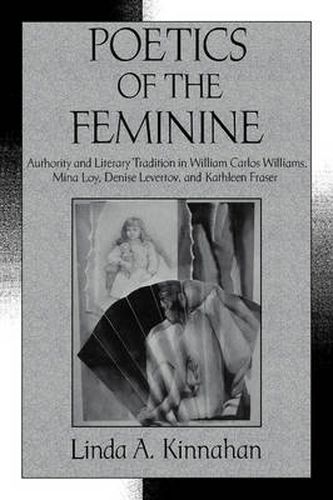Readings Newsletter
Become a Readings Member to make your shopping experience even easier.
Sign in or sign up for free!
You’re not far away from qualifying for FREE standard shipping within Australia
You’ve qualified for FREE standard shipping within Australia
The cart is loading…






This book examines the early work of William Carlos Williams in relationship to a woman’s tradition of American poetry, as represented by Mina Loy, Denise Levertov and Kathleen Fraser - three generations of women poets working in or directly from a modernist tradition. Linda Kinnahan traces notions of the feminine and the maternal that develop as Williams seeks to create a modern poetics. The impact of first-wave American feminism is examined through an extended analysis of Mina Loy’s poetry as a source of a feminist modernism for Williams. Levertov and Fraser are discussed as poetic daughters of Williams who strive to define their voices as women and to reclaim an enabling poetic tradition. In the process, each woman’s negotiations with poetic authority and tradition call into question the relationship of poetic father and daughter. Positioning Williams in relation to these three generations of Anglo-American writing within and descending from the modernist movement, the book pursues two questions: what can women poets, writing with an informed awareness of Williams teach us about his modernist poetics of contact, and just as importantly, what can they teach us about the process, for women, of constructing a writing self within a male-dominated tradition?
$9.00 standard shipping within Australia
FREE standard shipping within Australia for orders over $100.00
Express & International shipping calculated at checkout
This book examines the early work of William Carlos Williams in relationship to a woman’s tradition of American poetry, as represented by Mina Loy, Denise Levertov and Kathleen Fraser - three generations of women poets working in or directly from a modernist tradition. Linda Kinnahan traces notions of the feminine and the maternal that develop as Williams seeks to create a modern poetics. The impact of first-wave American feminism is examined through an extended analysis of Mina Loy’s poetry as a source of a feminist modernism for Williams. Levertov and Fraser are discussed as poetic daughters of Williams who strive to define their voices as women and to reclaim an enabling poetic tradition. In the process, each woman’s negotiations with poetic authority and tradition call into question the relationship of poetic father and daughter. Positioning Williams in relation to these three generations of Anglo-American writing within and descending from the modernist movement, the book pursues two questions: what can women poets, writing with an informed awareness of Williams teach us about his modernist poetics of contact, and just as importantly, what can they teach us about the process, for women, of constructing a writing self within a male-dominated tradition?